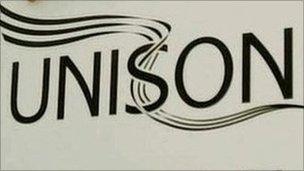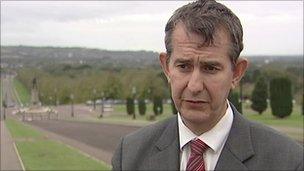About 1,000 hospital procedures cancelled due to strike
- Published

Unison members are to stage a 24-hour walk-out
About a thousand procedures will be cancelled at hospitals in Northern Ireland on Wednesday because of a 24-hour strike.
Health Minister Edwin Poots said the action by Unison members would hurt the "ill and vulnerable".
The strike will affect all health workers except doctors, and some school staff, and will begin at midnight.
The walk-out is in protest against front-line budget cuts.
Mr Poots said the strike action was "avoidable and unnecessary".
"I would encourage the unions to come and talk to me about the issues," he said.
"I have my concerns in terms of the budget and everything else, but we need to work through these things together.
"Eighty-seven per cent of Unison did not vote for this particular strike and I would encourage them to go to their work."
The health minister said it was not "good enough" that a thousand operations would be disrupted.
'Critical'
"It is not good enough that children, who are vulnerable children, will not be able to go to their schools tomorrow and I would encourage the unions to draw back from the brink, even at this point and engage with further talks with myself," he said.
Patricia McKeown of Unison said the situation was "critical" and needed to be put under a spotlight.
She defended the union's right to walk out.
"Recent reports indicated that we don't have a health service which is meeting its targets in critical areas such as accident and emergency," she said.

Edwin Poots said patients should check with the trust to see if their procedure would go ahead
"The workers are facing some of the worst cuts in their history. They have not been well treated or well served by the government and that is contemptible. The bottom line is that ordinary people are paying."
The majority of outpatient clinics and elective surgery scheduled for Wednesday will not take place, but cover for emergencies will be in place.
Mr Poots urged members of the public to check with the trust if their service was still available.
"I hope that many of the procedures will go ahead because many people will chose to come into work and ensure that the vulnerable and the ill are not affected by this particular strike," he said.
'Discomfort'
"None of the emergency work will be disrupted.
"It is the elective surgery but elective surgery is about people who have had a problem and need that problem to be repaired. Many of them are in pain and discomfort as a result of it."
Sean Donaghy, chief executive of the Northern Health Trust, said he could understand why colleagues in Unison were taking strike action over funding cuts but said it would have a "significant" effect within the trust.
"Each trust, I'm sure, will have its own arrangements to make," he said.
"For example, we're seeing hundreds of patients affected who would normally be assessing our hospital services.
"It has been necessary for us to cancel a range of services, given that staff are not available to staff those services, who have opted to take part in the strike action for the day."
Economist John Simpson suggested that Unison's strike action was premature.
"The core message is that we are generously funded by any standard within the UK," he said.
"We should be using what we have got more efficiently."
Mr Simpson said Mr Poots had not yet published his formal plan.
"The public will think we have got a strike before we have had adequate debate," he said.
The education budget is facing a shortfall of £300m over four years, whilst health is facing cuts of £2.3bn.
The Northern Health Trust has set up an information line for patients concerned about their appointments.
They can check what services have been affected on 028 2563 3758 or at the website: www.northerntrust.hscni.net
- Published4 October 2011
- Published23 September 2011
- Published30 June 2011
- Published22 September 2011
- Published14 January 2011
- Published15 December 2010